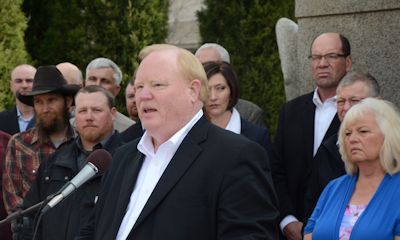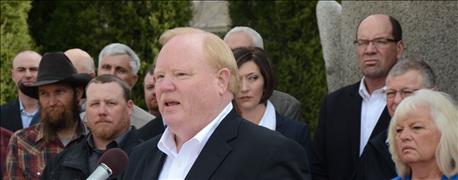
Nearly fifty farmers and ranchers gathered on the west steps of the Nebraska State Capitol yesterday to address what Nebraska Farm Bureau president Steve Nelson says is the number one issue facing Nebraska farmers and ranchers – property taxes. "We've seen, in the last ten years a 176% increase in ag land values, while at the same time statewide property values have only increased 12%," Nelson said. "There has been a huge shift of the burden onto agricultural land."

TOP PRIORITY: Nebraska Farm Bureau president addressed members of the media on the steps of the Nebraska State Capitol yesterday. "Property taxes have been the number one issue for Farm Bureau," Nelson said. "We've worked very hard, extensively to develop policy that addresses the issue of property tax and how we can fix the problem, how we can deal with the inequities, the imbalances that are in the system."
Earlier this week, Nebraska Gov. Pete Ricketts, along with Nebraska Department of Agriculture Director Greg Ibach, Nelson, and other representatives of agriculture participated in a "fly around" across the state to address some of the issues facing agriculture in honor of National Ag Week. "During the fly around, property tax was the number one issue we talked about. It's the number one issue for the Governor, and for the other organizations that were involved," Nelson said. "Most importantly, as we were able to take questions from the audience, property tax was the most asked-about issue that was brought up."
With a short legislative session this year, and no bills that have come to the floor from the Revenue Committee to address property taxes, Nelson and other members of Nebraska Farm Bureau gathered at the State Capitol yesterday to encourage senators to take action this session.
A spike in property taxes
York County Farm Bureau member and row crop farmer Jerry Stahr noted Nebraska agriculture's economic situation has changed in the last few years. "Seven to eight years ago the farm economy went through the roof. At that time we were going through an economic recession. Agriculture all of a sudden became a shining star in the state of Nebraska," Stahr said. "It kept the state kind of propped up in a poor economic time. We [in agriculture] are starting to go through that time now, because my income is diminishing with the price of corn and soybeans, while my property taxes are going up."
~~~PAGE_BREAK_HERE~~~
Now, with net farm incomes on the decline (according to USDA's Economic Research Service, farm incomes declined 38% in 2015), and high property taxes, it's difficult for some landowners to stay in business, said Jeff Metz, rancher and president of the Morrill County Farm Bureau, who also serves on the Morrill County Board of Commissioners.
"I know a lot of people are looking at having to get out of farming and ranching because they can't afford to pay property taxes," Metz said. "People clear across the state want to see something done on this issue, and I can tell you if the Legislature doesn't start to solve this problem, people are going to take it into their own hands. That's just how serious this issue is."
Balancing the three-legged stool
At the heart of the matter, Stahr said, is the state aid formula for Nebraska's public schools – otherwise known as the Tax Equity and Educational Opportunities Support Act (TEEOSA).


Jerry Stahr (left) and Jeff Metz
Nebraska's public schools are funded by a "three-legged stool" of property tax, sales tax, and income tax. Currently, that stool is made up of 51% of property tax, 22% sales tax, and 33% income tax. In other states, the property tax leg comprises an average of 32%. "Right now it [the stool] is so tilted it's about ready to fall down," Stahr said.
Meanwhile, not all school districts receive their share of funding – especially rural schools. Stahr said two-thirds of the schools in Nebraska receive no funding through the TEEOSA formula, most of them rural. Some districts are able to spend more per pupil due to higher property values, but the districts that can spend the most aren't always the districts with the highest needs.
However, Metz added, quality education is important – it's about identifying a different means to fund public schools. "Good schools are very important. My wife's a teacher, I have kids in school, we support our schools," he said. "But we've got to find a different way to fund them. We cannot just rely on property taxes, particularly for a lot of rural districts who don't receive any equalization aid."
~~~PAGE_BREAK_HERE~~~
What can be done this session?
With this year's short session, and with all the major pieces of legislation related to property taxes remaining in both the Legislature's Education and Revenue Committees, Nelson, Stahr, and Metz encouraged members of the Legislature to focus on property tax as a priority. These include LB883, which is focused on alternative school funding sources; LBs 882, 958 and 959, which provide a form of spending limit on schools and local governments to address increasing demands on property taxes; LB717, which would slow down the increases in ag land valuations; and LB1013, which would provide a new revenue source for providing property tax relief.

They cautioned the Legislature on spending time debating LR378CA, a proposed constitutional "Right to Farm" amendment. Nelson said the amendment might address issues important to agriculture, it needs more work and study before being debated. "With the very small amount of time we have left in this legislative session, I think it is a distraction," he said. "Every minute we spend talking about other issues is time taken away from talking about property taxes."
"What we're faced with now is what can be done this year," Nelson said. "I think it's something that can be done so we can take some sort of incremental step in the right direction."
About the Author(s)
You May Also Like






